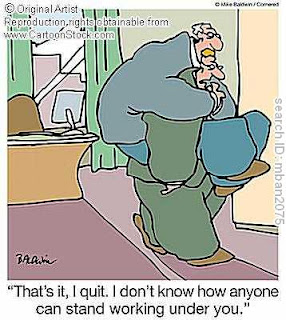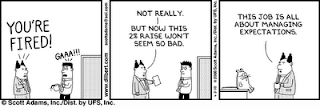
What comes to mind when you hear the the term "managing", is how to manage your subordinates. While, managing subordinates is the focus, most of the time, you should not ignore managing upwards. In the everchanging business environment and the re-organisations of management structures, managing yourself to work with your boss, is becoming even more critical. In the book "It Takes Two" Gene Boccialetti talks about three dimensions that make up a person's style.By knowing your style and your boss's style, you can manage yourself in the authority relationship. More important is to know the circumstances when your style works best, and when it is likely to fail you.
Boccialetti identifies three main factors that make up subordinate style: Deference, Distance and Divergence.
Deference asks the question: How important is it, that I hold onto a large share of power in relationship to my boss and try to exert influence in decision making?
Managers who are low in deference tend to push back, resist and counter argue everything that their bosses say. They want a large say in problem solving and decision making. They tend to be uncomfortable with implementing decisions that they did not have a hand in making, particularly where the reasoning behind the decision is unclear to them. They tend to thrust their own judgements and ideas at least, as much as they do the boss's. People with high educational credentials are generally associated with lower deference to authority. A common spectacle in the high technology R&D organisations. A common characteristic of low deference orientation is a discomfort with many of the customary trappings of authority, such as status symbols and other special privileges. In their view, deference means loss of dignity; the act of deference is equated with playing tactics and even so called kissing up.
Managers who are high in deference are content to let their bosses sort out priorities and solve problems. They may act as good soldiers and prefer to have their impact through action and implementation. They like the boss to be clear and provide structure and guidance.High deference managers are disproportionately represented in engineering, finance and accounting.

Distance asks the question: How important is it that I establish a person-to-person, not just a role-to-role, relationship with my bosses?
A manager who is oriented to a more personal relationship has a low-distance style.Such a manager believes that a boss and subordinate should establish more personal contact and engage in more personal disclosure in the course of business together. They argue that the such personal contact improves decision making, performance, and motivation. Having close relationship with the boss, gives them the feeling of confidence and security that the boss will be interested in their own development and advancement.People from human resources, sales and marketing are more oriented to personalizing relationships than those in accounting and engineering.

On the other hand, managers who prefer to maintain a more business-like or arm's-length approach to relationship, have a high-distance style. They believe that more work can be done because less time is consumed talking about things that are not immediately and obviously relevant, to the task at hand. They also feel less political vulnerability in this orientation, as there is less chance that personal information might be used against them.
Divergence asks the question: How important is it for me to protect myself? Should I assume our goals are aligned, our methods are alike, and my boss is my ally, not my competitor or even my adversary?
Subordinate managers with an orientation to low divergence assume there is a close alignment between themselves and their bosses over legitimate goals and the means for achieving those goals. The boss is seen as an ally who can be trusted.Many low-divergence subordinates see the big decisions being made at higher organisational levels and accept that their primary contributions are made by joining others to operationalise decisions.Government agencies, hospitals, military rank lowest in divergence.
Subordinate managers with an orientation to high divergence, on the other hand, tend to see the boss as a competitor or adversary and are likely to mistrust the boss.They see the relation to authority as one that is very likely to involve divergence over goals and over the means for achieving them. Rather than trying to directly influence the boss, high-divergence managers would generally chose other options like sabotaging thieir bosses' directives, independent action, finding allies and forming a coalition, leaving the organisation, or blowing the whistle.
Deference, Distance, and Divergence are the factors that make up subordinate style, but they do not occur in isolation. The varied degrees of each of these factors, combined in different ways, result in an individual style. You have to assess your style based on the above factors.

To be effective in managing upwards, you have to develop flexibility in your approach. You have to recognise the situation that would be better handled with a style, different from your usual and accustomed approach. If you are a person with low deference, you need to pay special attention to crisis situations. This is no time to push back and seek influence. It is time for action. Similarly, if you are a person with low distance style and realise confidences are not respected and you have clear data to support it, then be careful and selective in whom you confide.
Find out what your boss thinks of your effectiveness, as a pair. Find out how your boss judges this effectiveness. Find out how your boss sees you, on each of the three factors.Does your boss's view differ from your view of yourself? If so, find out why? Then, develop a plan to bring underused traits into play - if you lean towards accomodating the boss, then work at being more inner-directed - pushing for influence. Establish clear unambiguous behavioral indicators and monitor it.
Continually monitor, get feedback, adjust, evaluate and monitor again until new, variable patterns become reflexive and shifting your orientation becomes second nature.
Happy reading and good luck in identifying your style and managing upwards.
-Ram








